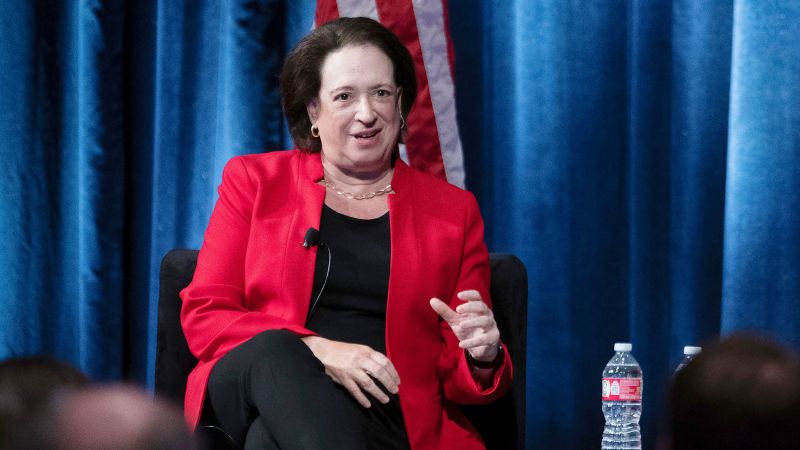Sacramento, California
CNN
—
Justice Elena Kagan on Thursday defended the code of conduct the Supreme Court created last year, but conceded there needs to be a way to enforce the rules for it to be more effective.
“I think that the rules that we put out are good ones,” Kagan said at a judicial conference in Sacramento. “I think that the thing that can be criticized is, you know, rules usually have enforcement mechanisms attached to them. And this one, this set of rules does not.”
After the Supreme Court came under intense scrutiny in 2023 following a series of blockbuster investigative pieces that turned a spotlight on the alleged ethical lapses of several of the justices, the nine justices released an ethics code in November in an attempt to assuage concerns raised by Democratic lawmakers and others that its members had no formal code of conduct they were required to adhere to.
But notably absent from the code of conduct was an enforcement mechanism to hold justices accountable for any violations of the code, leading some court observers to regard it as a toothless Band-Aid for larger ethics issues that have dogged the court. The document leaves a wide range of decisions up to the discretion of individual justices, including decisions on recusal from sitting on cases.
The comments were made during a wide-ranging conversation before an audience of judges and lawyers at the 9th US Circuit Judicial Conference, in response to a question from one of the event’s moderators.
Kagan made the first public appearance of the nine justices since the court wrapped up a historic and contentious session earlier this month in which Kagan and her two liberal colleagues found themselves on the losing side of many of the biggest cases.
Here’s a roundup of Kagan’s comments:
Kagan on Thursday called criticism of the code of conduct “fair,” and went on to say that she thought the best enforcers of it for the Supreme Court would be lower-court judges, but not the justices themselves.
“I can’t think of other people who should enforce a code of conduct … against judges. And I think it would be quite bad … for us to do it to each other,” she said. “In other words, for the same judges who are sitting around the table trying to decide cases, to be to be the people who are saying, ‘Oh, no, you broke that rule or you didn’t break that rule.’”
In order to do this, Kagan suggests Chief Justice John Roberts look elsewhere in the federal judiciary.
“I feel as though however hard it is that we could and should try to figure out some mechanism for doing this,” the liberal justice said. “I have a lot of trust and faith in the chief justice. You know, if the chief justice appointed some sort of committee of, you know, highly respected judges with a great deal of experience, with a reputation for fairness, you know, that seems like a good solution to me.”
Kagan said that she was sharing only her own opinion.
“I’m doing no intimating here,” she said, attempting to dismiss any speculation that she was revealing anything that the court was actively working on. “This is one person’s view and that’s all it is.”
Kagan’s criticism of the court on Thursday was not limited to its new code of conduct. She also expressed frustration with the large number of concurrences her colleagues have been issuing in cases, which she described as “not a good thing for the court.”
“It prevents us, I think, from giving the kind of guidance that lower courts have a right to expect, that the public has a right to expect. It muddies the waters of our decisions,” she said.
Kagan specifically pointed to the court’s decision in US v. Rahimi, a major Second Amendment case the court decided earlier this year in which the majority upheld a federal ban on domestic abusers having guns. Though the ruling was 8-1, with Roberts writing for the majority, a flurry of separate writings from many members of the court were also issued.
“Everybody sort of tries to spin it one way or another way,” she said. “Often people use separate opinions to pre-decide issues that aren’t properly before the court and that, you know, may come before the court in a year or two and sort of to try to give signals as to how lower court should decide that, which I don’t think is right.”
“There are definitely times where separate opinions make sense,” Kagan continued, noting that she wrote one this session. “I think all the time we’re in a position where we look at the majority opinion and we say, ‘Not the way I would have written it.’ But I think we should have a higher threshold for saying, ‘But it’s, you know, it will do. It’s OK enough, I agree with it enough. And the world doesn’t need to hear my separate thoughts on like a better opinion that could have been written.’”
Kagan also made clear that she was growing impatient with the increased use of the court’s emergency docket, in which the court can issue unsigned and unexplained orders that allow the justices to act on a case while also shielding the legal analysis behind the decision and the vote count.
Use of the emergency, or shadow, docket increased dramatically during the Trump administration, where the Justice Department used the docket to seek relief in cases that affect wide swaths of the country and that would have usually been decided by the justices following the normal process. Under President Joe Biden, GOP-led states and other private litigants have used the docket in challenges to various federal actions, often forcing the court to hear the merits of the disputes.
“Because we granted a number of them and in the early years of the Trump administration, I think it encouraged people to keep bringing these kinds of petitions for emergency relief from us,” Kagan said.
There are currently several matters pending on the Supreme Court’s emergency docket, including some challenging the Biden administration’s key student loan repayment program and the new rules issued by the Department of Education under Title IX, which prohibits sex discrimination in schools that receive federal funding.

